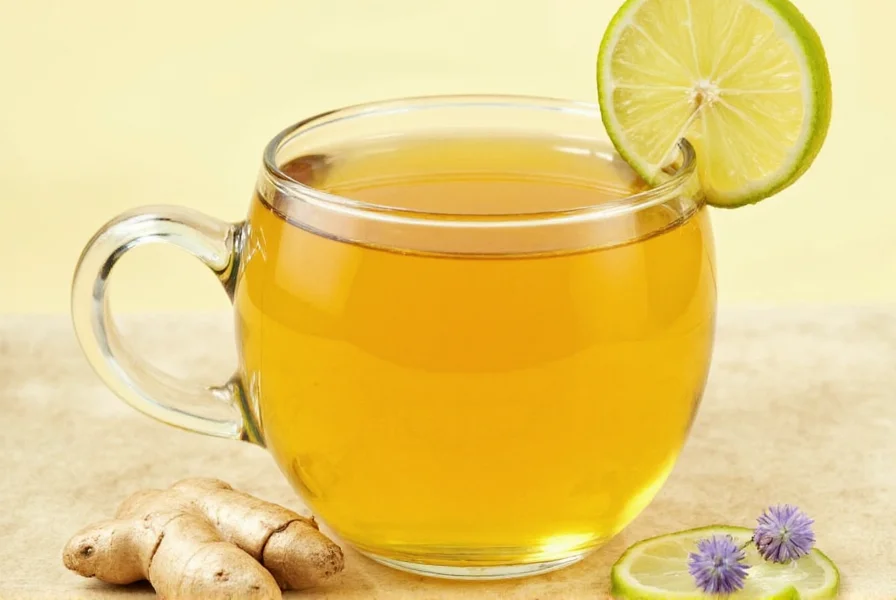For centuries, cultures worldwide have turned to ginger and lemon tea as a natural remedy for various ailments. This simple beverage combines two powerful ingredients with complementary health properties. Modern research continues to validate many traditional uses while providing deeper understanding of how this combination works in the human body.
Scientifically Supported Health Benefits
Digestive Health Enhancement
Ginger contains active compounds called gingerols that stimulate digestive enzymes and accelerate gastric emptying. A 2020 review in Nutrients confirmed ginger's effectiveness in reducing nausea and improving digestion. Lemon's citric acid supports bile production, further aiding digestion. Together, they create a synergistic effect particularly beneficial after meals or during digestive discomfort.
Immune System Support
The vitamin C in lemon provides well-documented immune support, while ginger's antimicrobial properties help combat pathogens. Research published in the Journal of Ethnopharmacology demonstrated ginger's ability to inhibit viral replication. Though not a cure for illnesses, regular consumption may strengthen your body's natural defenses against common infections.
Anti-Inflammatory Properties
Chronic inflammation underlies many modern diseases. Ginger contains potent anti-inflammatory compounds that inhibit inflammatory pathways similar to some pharmaceuticals, but without the side effects. A clinical trial in Arthritis found ginger extract significantly reduced osteoarthritis pain. Lemon's flavonoids complement this effect, making the combination valuable for managing inflammation-related conditions.
| Benefit Category | Key Compounds | Scientific Evidence Level |
|---|---|---|
| Digestive Support | Gingerols, Citric Acid | Strong clinical evidence |
| Immune Function | Vitamin C, Gingerols | Moderate clinical evidence |
| Anti-Inflammatory | Gingerols, Flavonoids | Strong laboratory evidence |
| Antioxidant Protection | Vitamin C, Terpenes | Moderate laboratory evidence |
Antioxidant Protection
Both ingredients provide significant antioxidant benefits. Lemon delivers vitamin C and flavonoids, while ginger offers gingerols and shogaols. These compounds neutralize free radicals that cause cellular damage. A study in Oxidative Medicine and Cellular Longevity showed ginger supplementation increased antioxidant enzyme activity in participants. Regular consumption of ginger lemon tea contributes to your daily antioxidant intake, supporting cellular health.

Hydration and Nutrient Absorption
While all tea contributes to hydration, the lemon component enhances water absorption due to its electrolyte content. The warm temperature also improves hydration efficiency compared to cold beverages. Additionally, vitamin C in lemon increases iron absorption from plant-based foods, making this tea particularly beneficial when consumed with meals containing iron-rich vegetables.
Preparing Therapeutic Ginger Lemon Tea
For maximum benefits, prepare your tea properly:
- Use fresh ginger root (1-2 inches), thinly sliced or grated
- Add to 2 cups of boiling water and simmer for 10-15 minutes
- Remove from heat and add juice of half a lemon
- Optional: Add a small amount of raw honey after cooling slightly
- Avoid boiling the lemon to preserve vitamin C content
For digestive benefits, consume 20 minutes before meals. For immune support, drink throughout the day. The optimal daily amount is 2-3 cups, as excessive consumption may cause side effects.
Potential Side Effects and Considerations
While generally safe, ginger lemon tea may cause issues for some individuals:
- Heartburn or acid reflux in sensitive individuals
- Interactions with blood-thinning medications (ginger has mild anticoagulant properties)
- Dental enamel erosion from excessive lemon consumption
- Potential stomach irritation at very high doses
Pregnant women should consult their healthcare provider before regular consumption, as high ginger intake may affect pregnancy. Those with gallstones should exercise caution as ginger may increase bile production.
Understanding Research Limitations
When evaluating claims about ginger lemon tea benefits, consider these research limitations:
- Many studies examine ginger or lemon separately, not the combination
- Dosage in studies often exceeds typical tea consumption
- Most human studies use ginger extracts rather than tea preparations
- Individual responses vary based on genetics and health status
The health benefits of ginger lemon tea represent complementary support, not medical treatment. Always consult healthcare professionals for medical conditions rather than relying solely on natural remedies.

Frequently Asked Questions
Can ginger lemon tea help with weight loss?
Ginger lemon tea may support weight management through several mechanisms: it can boost metabolism slightly, reduce inflammation that contributes to weight gain, and promote feelings of fullness. However, it's not a standalone solution for weight loss. Research shows modest effects when combined with a balanced diet and regular exercise. The primary benefit comes from replacing sugary beverages with this zero-calorie alternative.
How often should I drink ginger lemon tea for maximum benefits?
For general health maintenance, 1-3 cups daily provides optimal benefits without risk of side effects. Those seeking digestive support may benefit from consuming a cup 20 minutes before meals. For immune support during cold season, 2-3 cups throughout the day can be helpful. Avoid excessive consumption (more than 4 cups daily) as this may lead to heartburn or other digestive issues in sensitive individuals.
Does ginger lemon tea really help with nausea?
Yes, multiple clinical studies confirm ginger's effectiveness against nausea. A systematic review in the American Journal of Obstetrics and Gynecology found ginger significantly reduced pregnancy-related nausea. The active compounds in ginger (gingerols and shogaols) work on serotonin receptors in the digestive tract to calm nausea. For best results, drink freshly prepared ginger lemon tea at the first sign of nausea, as the warmth and lemon complement ginger's anti-nausea properties.
Can I drink ginger lemon tea on an empty stomach?
Most people can safely drink ginger lemon tea on an empty stomach, and it may actually help prepare your digestive system for meals. However, those with sensitive stomachs or acid reflux may experience discomfort. If you have gastrointestinal issues, start with a weaker preparation (less ginger) and monitor your body's response. The lemon content makes it slightly acidic, so individuals with ulcers should consult their doctor before regular consumption on an empty stomach.
How long does it take to experience benefits from ginger lemon tea?
The timeline for experiencing benefits varies by effect. Digestive improvements may be noticeable within 30 minutes of consumption. For immune support, regular consumption over 2-4 weeks shows more consistent results in studies. Anti-inflammatory effects typically require consistent daily consumption for several weeks to months. Individual responses vary based on overall health, diet, and the specific condition being addressed. For acute issues like nausea, effects can be immediate, while chronic conditions require sustained use.











 浙公网安备
33010002000092号
浙公网安备
33010002000092号 浙B2-20120091-4
浙B2-20120091-4